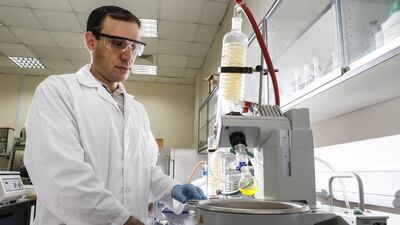SHARJAH // A research project at the American University of Sharjah has put the UAE in the vanguard of the fight against cancer.
An AUS team is developing a way to diminish the side effects of chemotherapy by using tiny capsules that target only damaged areas, not healthy cells.
“This research is at the forefront of the fight against cancer and brings AUS and the UAE into the international arena as notable contributors to medical and scientific research,” said Dr Mohammad Al Sayah, a professor of organic chemistry and a member of the team.
The nano-capsule, hundreds of times smaller than a human cell, is injected into the body and triggered by ultrasound, releasing the drugs only where necessary and greatly increasing their efficiency.
“When the medication is inserted into the patient it doesn’t harm the healthy cells so you avoid things like heart failure, hair loss and digestive problems,” said Dr Ghaleb Husseini, professor of chemical engineering and the lead researcher.
“People can survive the cancer but die because of congestive heart failure. Some of these drugs are extremely toxic to the heart muscle.”
The research is being carried out by the Ultrasound in Cancer Research Group at AUS, which consists of students, academics and visiting professors.
For the past three years it has been funded by internal grants but the team at the recently established drug delivery laboratory now needs more funding.
It has successfully synthesised two nano-capsules and is now targeting cancer cells in test tubes, which Dr Husseini said is “showing promising results”.
The focus so far is on breast, colon and prostate cancers, all of which are common in the UAE.
The treatment will not work with lung or brain cancers. Air pockets in the lungs and the skull block ultrasound waves.
“The drug is sequestered inside small carriers designed to target preferably the tumour cells,” Dr Al Sayah said.
“Once at the tumour site, focused waves of ultrasound are directed at the tumour to break open the carriers, releasing the drug into the cancer cells.”
The research was crucial for the country and the university, he said. “The project introduces the first combination of the two technologies, targeted nano-carriers and ultrasound waves, into the drug delivery method for cancer treatment.”
The research is still in its early stages. Results are promising but several years of studies and advanced clinical trials are needed. The next hurdle is funding.
“The project has been funded by a generous grant from AUS, yet more financial support is still needed to complete the first phase of the project and continue with the in vitro studies,” Dr Al Sayah said.
“We are currently submitting grant applications to several local and international agencies.”
Belinda Bosch Farah, 49, a breast cancer survivor, said she would have undergone the treatment had it been available when she first received her diagnosis seven years ago.
At the time, Ms Farah was advised to have a mastectomy. Since then she has taken Tamoxifen, a chemotherapy-based drug, to suppress the production of oestrogen.
“There were many side effects,” she said. “At first it made me extremely emotional, suppressing the oestrogen and putting you into early menopause, so it was constant emotional fluctuation.”
But things got worse.
“They took me off it a year ago and found that people taking Tamoxifen might have bone-density problems,” Ms Farah said.
After tests, doctors discovered early stage osteoporosis in her pelvis. That has now spread up her spine.
“It was really depressing because you try and fix one thing and it messes up 10 other things,” she said. “If I had the option to do something like this new treatment I would definitely have done it. It really could change people’s lives.”
mswan@thenational.ae

